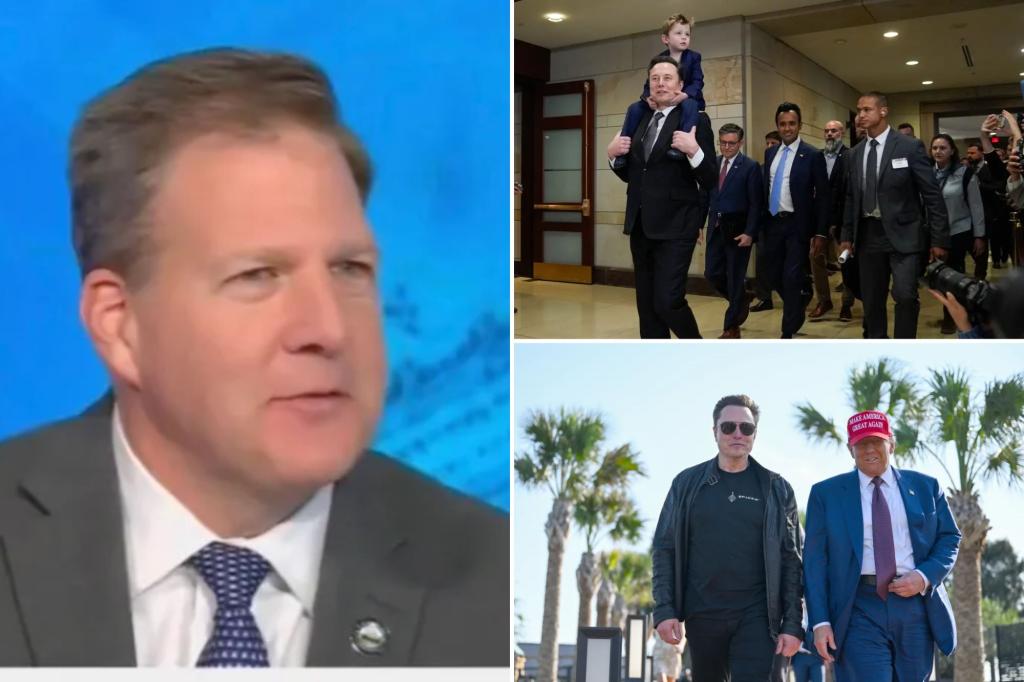Chris Sununu, the outgoing Republican Governor of New Hampshire, expressed strong support for Elon Musk’s involvement in advising the incoming Trump administration on fiscal matters, dismissing concerns about potential conflicts of interest stemming from Musk’s extensive government contracts. Sununu argued that Musk’s immense wealth, estimated at $450 billion, insulates him from financial influences, suggesting that his motivation lies in a broader vision for America rather than personal gain. He drew parallels between himself and Musk, highlighting their shared engineering backgrounds and fiscally conservative viewpoints, further solidifying his endorsement of Musk’s involvement. Sununu also expressed optimism about Musk’s potential to streamline government operations through the “Department of Government Efficiency” (DOGE), an initiative focused on identifying and eliminating wasteful spending.
Sununu’s defense of Musk rests on the premise that his vast fortune renders him immune to the corrupting influence of financial incentives. He believes that Musk’s primary motivation is to improve government efficiency and contribute to a stronger America, not to enrich himself further. This argument, however, overlooks the potential for non-monetary influences. Musk’s businesses, including SpaceX and Tesla, rely heavily on government contracts and regulations. His policy recommendations could inadvertently, or even intentionally, benefit his companies, even without direct financial gain. Critics argue that even without the direct pursuit of monetary gain, Musk’s involvement creates a perception of impropriety and raises concerns about undue influence on government decisions.
Furthermore, Sununu’s comparison of state-level efficiencies to the federal government’s potential for cost-cutting simplifies a complex issue. State governments operate on a smaller scale and with different responsibilities than the federal government. Directly transferring efficiency measures from one level to the other may not be feasible or effective. The federal government’s vast and intricate network of agencies and programs presents unique challenges that require tailored solutions, not simply replicating state-level approaches. While states may have implemented certain efficiencies, the scale and complexity of the federal government necessitate a more nuanced approach.
Sununu’s optimism about Musk’s ability to influence positive change within the Trump administration also contrasts with his previous criticism of the former president. During the 2024 Republican primaries, Sununu openly criticized Trump’s temperament and fiscal policies, particularly the increased government spending during his first term. He even endorsed Nikki Haley, a rival candidate, highlighting his reservations about Trump’s leadership. Now, however, Sununu expresses “cautious optimism” about a second Trump term, attributing this shift to a perceived change in Trump’s approach and the team surrounding him. He suggests that Trump has gained a better understanding of Congress and has assembled a more professional team, including “outsiders” like Musk, which he believes will lead to more effective governance.
This newfound optimism, despite his past criticisms, raises questions about the consistency of Sununu’s political stance. His previous concerns about Trump’s fiscal policies seem to have been overshadowed by the prospect of Musk’s involvement. This shift suggests that Sununu prioritizes fiscal conservatism above other concerns, such as Trump’s temperament and leadership style, which he previously criticized. It remains to be seen whether Trump’s second term will truly reflect the fiscal responsibility that Sununu anticipates, or if his optimism is misplaced.
The reference to the “Department of Government Efficiency” (DOGE) adds another layer of complexity to the situation. Despite its official-sounding name, DOGE is not an actual government department. Its informal nature raises questions about its legitimacy and authority to implement meaningful reforms. While Musk’s involvement may bring attention to government efficiency, the lack of a formal structure for DOGE limits its potential impact. Without official recognition and established procedures, DOGE’s ability to drive significant change within the vast bureaucracy of the federal government remains uncertain. Its effectiveness hinges on the willingness of existing government agencies to cooperate and adopt its recommendations.
Finally, Sununu’s warnings about an impending “financial crisis” due to rising national debt underscore the urgency of addressing fiscal issues. He projects that interest payments on the national debt could reach $1.8 trillion in ten years due to high interest rates, emphasizing the need for immediate action to control spending and reduce the debt burden. This concern aligns with his support for Musk’s involvement, as he sees Musk as a potential catalyst for much-needed fiscal reforms. However, the success of any such reforms will depend not only on Musk’s influence but also on the cooperation of Congress and the willingness of the administration to implement difficult but necessary changes. The political realities of budget negotiations and the competing priorities of different stakeholders will significantly impact the feasibility of achieving substantial reductions in government spending.

